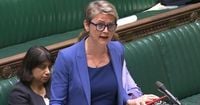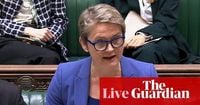The United Kingdom’s Labour government has ignited fierce debate by announcing a temporary suspension of new applications under the refugee family reunion scheme, a move framed as a response to mounting pressures on the asylum system and a surge in support for far-right parties. Home Secretary Yvette Cooper delivered the news to Parliament on September 1, 2025, explaining that the current rules are “no longer sustainable or fair” and promising a complete overhaul of the asylum process by spring next year.
Under the now-paused system, refugees granted indefinite leave to remain could bring over children under 18 and partners with whom they had shared a relationship for at least two years. But, as Cooper told MPs, the landscape has shifted dramatically: “Even just before the pandemic, refugees who applied to bring family to the UK did so on average more than one or two years after they had been granted protection – long enough for them to be able to get jobs or find housing or able to provide their family with some support. […] But here in the UK now, however, those applications come in, on average, in around a month after protection has been granted – often even before a newly granted refugee has left asylum accommodation.”
This acceleration, according to the Home Secretary, has placed acute pressure on local authorities. Some councils now report that over a quarter of their family homelessness applications are linked to refugee family reunion. “That is not sustainable,” Cooper stressed, highlighting that refugees arriving so quickly after their sponsors receive protection are far more likely to require homelessness assistance.
The government’s decision comes amid a volatile political climate. Anti-immigration protests have surged, with demonstrators targeting hotels housing asylum seekers—most recently in Epping, northeast of London. The Labour government, under Prime Minister Keir Starmer, faces mounting pressure from Nigel Farage’s hard-right Reform UK party, which has capitalized on frustrations over small boat arrivals across the English Channel. In response, the government has pledged to accelerate plans to empty asylum hotels and demonstrate a firmer grip on the system inherited from previous Conservative administrations.
Cooper’s statement to Parliament was wide-ranging, promising not only the suspension of the family reunion route but also radical reforms. The government will introduce new requirements for contributions and impose longer waiting periods before newly granted refugees can apply to bring family members. These details will be set out in a forthcoming asylum policy statement, with the aim of implementing significant changes by spring 2026. In the meantime, refugees will be subject to the same family migration rules as British citizens and long-term residents, through the Appendix FM process.
Charities and refugee advocates have been quick to condemn the move. Safe Passage, which supports child refugees, warned on social media: “The consequences will be devastating for the children we support, who've now been stripped of almost every safe route to join their loved ones.” Enver Solomon, chief executive of the Refugee Council, echoed these concerns, arguing, “Far from stopping people taking dangerous journeys to cross the Channel, these changes will only push more desperate people into the arms of smugglers in an effort to reunite with loved ones.”
Cooper defended the government’s approach, insisting that “the system has to be controlled and managed based on fair and properly enforced rules, not chaos and exploitation driven by criminal smuggler gangs.” She argued that without immediate action, the system would remain vulnerable to exploitation, with smuggler gangs reportedly using the promise of family reunion to encourage dangerous crossings. “The proportion of migrants who have arrived on small boats and who then apply to bring family has also increased sharply in recent years, with signs that smuggler gangs are now able to use the promise of family reunion to promote dangerous journeys to the UK,” she told Parliament.
The government’s broader reforms include a complete overhaul of the asylum appeals system, which currently leaves tens of thousands of people in limbo. The average waiting time for asylum appeals now stands at 54 weeks, a figure Cooper described as “the biggest obstacle to reducing the size of the asylum system and ending hotel use.” To address this, a new independent body staffed by professionally trained adjudicators will be established, with the capacity to prioritize and accelerate cases as needed.
International cooperation is also a cornerstone of the government’s new strategy. In August 2025, the UK signed a treaty with France, allowing for the direct return of those arriving by small boats. The first detentions under this agreement took place immediately after signing, and returns are expected to begin later in September. A pilot “one in, one out” reciprocal legal route will also be launched, prioritizing family groups and subjecting all applicants to strict security checks.
To bolster enforcement, the government has announced a £100 million increase in border security funding and plans to add up to 300 new personnel to the National Crime Agency, focusing on dismantling smuggler gangs. Detention capacity will be expanded by 1,000 beds at Campsfield and Haslar, and digital ID systems are being rolled out to help immigration enforcement verify individuals’ right to work or reside in the UK.
Despite these measures, opposition parties remain skeptical. Shadow Home Secretary Chris Philp criticized Cooper for what he described as ineffectual “tweaks,” pointing out that Channel crossings by small boat have risen 38% in 2025 compared to the previous year, reaching a record high. Philp called for more drastic action, including disapplying the Human Rights Act for all immigration matters and ensuring that every person crossing the Channel is immediately removed. “That is not success, that is failure,” he said, urging the government to take responsibility rather than blaming its predecessors.
Cooper, for her part, acknowledged the UK’s “long and proud history” of providing sanctuary to those fleeing persecution or conflict, but argued that reforms are necessary to ensure the system remains fair and sustainable. “We continue to believe that families staying together is important, which is why we will seek to prioritise family groups among the applicants to come to Britain under our new deal with France, but reforms are needed,” she said.
Looking ahead, the government has signaled its intention to set out a permanent framework for refugee students and capped, managed routes for refugees to work in the UK. The ambition, according to Cooper, is to “fix every aspect of the broken system we inherited and to restore the confidence of the British people, solving problems, not exploiting them, with a serious and comprehensive plan, not fantasy claims based on sums that do not add up or gimmicks that failed in the past.”
As the UK grapples with the twin pressures of humanitarian responsibility and domestic political turbulence, the coming months will reveal whether these reforms can strike a balance between compassion, control, and public confidence.






